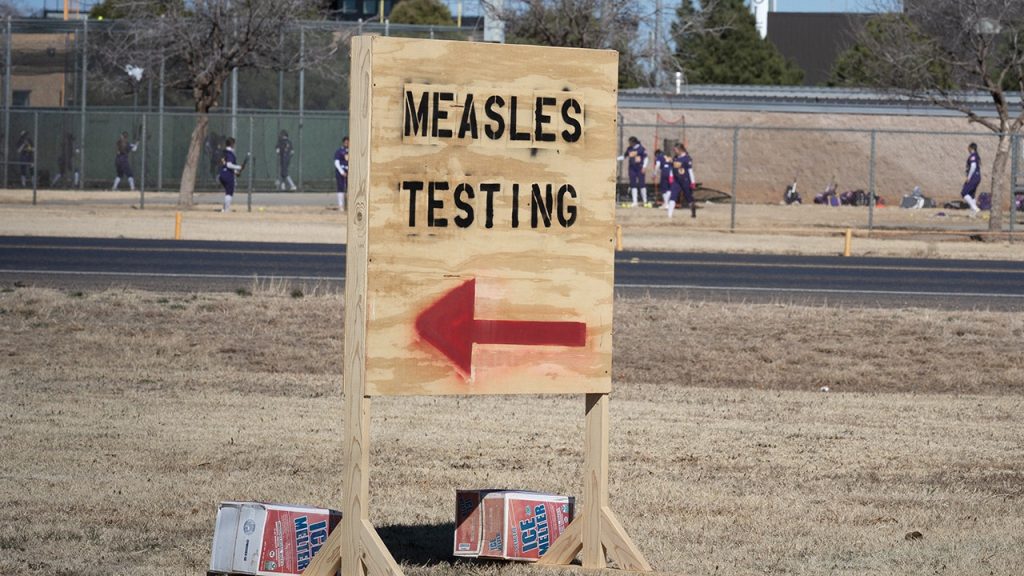Summary
A recent measles outbreak has claimed its latest victim in New Mexico, with state officials confirming the death of an unvaccinated adult. This incident follows the earlier death of a child in Texas attributed to the same outbreak, which has resulted in nearly 160 infections across the region. Health authorities are urging communities to consider vaccination as a critical measure to combat the disease and prevent further fatalities.
| Article Subheadings |
|---|
| 1) Overview of the Measles Situation |
| 2) Details of the Recent Fatalities |
| 3) Public Health Response and Recommendations |
| 4) The Impact of Vaccination |
| 5) Long-Term Implications of the Outbreak |
Overview of the Measles Situation
The outbreak of measles in the U.S. has reached alarming proportions, particularly in the border regions of New Mexico and Texas. As cases have surged to nearly 160 across the area, health officials are sounding the alarm regarding the potential for further spread, especially among populations with low vaccination rates. Measles is a highly contagious viral disease that can lead to severe complications, and it primarily spreads through respiratory droplets when an infected person coughs or sneezes. Its resurgence poses significant health risks, particularly to unvaccinated individuals.
Details of the Recent Fatalities
The death of the unvaccinated adult from New Mexico appears to be a tragic outcome of the ongoing outbreak. Officials reported that this individual had not sought medical help prior to their passing, and while the exact cause of death is still under investigation, it is understood that measles played a critical role. This incident follows an earlier death of an unvaccinated child in Texas who succumbed to the same disease. These fatalities underscore the urgent need for public health interventions and community awareness regarding the dangers posed by measles.
Public Health Response and Recommendations
In response to the outbreak, local and federal health organizations, including the U.S. Centers for Disease Control and Prevention (CDC), have mobilized resources to combat the spread of measles. Dr. Chad Smelser, the deputy state epidemiologist, has emphasized the importance of the measles-mumps-rubella (MMR) vaccine as a protective measure. Officials are advocating for vaccinations, especially among children, whom studies indicate comprise the bulk of the infected individuals. Furthermore, health authorities have recommended that adults lacking evidence of immunity also receive the MMR vaccine to prevent further transmission of the disease.
The Impact of Vaccination
Vaccination remains a cornerstone of public health strategy against measles, as emphasized by recent statements from various health officials.
“The measles-mumps-rubella vaccine is the best protection against this serious disease,”
stated Dr. Smelser. Vaccination programs are critical not only for individual protection but also for creating community immunity, which can protect vulnerable populations who cannot be vaccinated due to medical reasons. Despite the availability of preventive measures, the decline in vaccination rates in many communities has contributed to the outbreak’s severity, highlighting the need for renewed efforts to improve public health education.
Long-Term Implications of the Outbreak
The ongoing measles outbreak carries significant public health implications beyond immediate health consequences. If the current trend continues unchecked, health experts warn of the potential for wider epidemics, which could strain healthcare resources and lead to increased morbidity and mortality rates. Furthermore, sustaining an outbreak could foster public skepticism towards vaccinations, undermining efforts to rebuild community immunity levels. It raises critical questions about the balance between personal choice and public health necessities, as evidenced by the recent comments from Health and Human Services Secretary Robert F. Kennedy Jr., who advised the public to consider vaccination while also advocating for personal vaccination choices.
| No. | Key Points |
|---|---|
| 1 | A New Mexico adult has died due to measles, making it the tenth confirmed case in Lea County. |
| 2 | The outbreak has resulted in nearly 160 measles infections in Texas and New Mexico. |
| 3 | Public health officials recommend the MMR vaccine as the primary defense against measles. |
| 4 | Health authorities are responding with vaccination campaigns and educational initiatives to curb the outbreak. |
| 5 | The outbreak could have long-term implications for public health and community immunity efforts. |
Summary
The recent measles outbreak in New Mexico and Texas highlights a troubling trend of rising infections and fatalities linked to unvaccinated populations. As health authorities strive to manage the situation through vaccination advocacy and public health measures, the need for community participation in vaccination programs has never been more critical. Without a concerted effort to improve vaccination rates, this outbreak serves as a stark reminder of the vulnerabilities communities face in combating preventable diseases.
Frequently Asked Questions
Question: What is measles and how does it spread?
Measles is a highly contagious viral disease that spreads through respiratory droplets from coughs or sneezes of an infected person. It can also remain airborne and infectious for several hours after an infected person has left an area.
Question: What are the symptoms of measles?
Common symptoms of measles include high fever, cough, runny nose, inflamed eyes, and a characteristic red, blotchy skin rash that typically appears 3 to 5 days after the initial symptoms.
Question: Why is the MMR vaccine important?
The MMR vaccine protects against measles, mumps, and rubella, providing immunity to these serious and potentially life-threatening diseases. Vaccination is critical for individual and community health, as it helps achieve herd immunity and prevents outbreaks.


